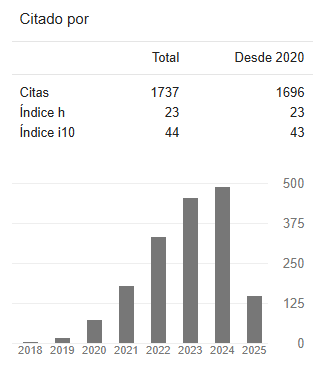Instructions about the structure of manuscript of Revista Cátedra
DOI:
https://doi.org/10.29166/catedra.v1i1.761Keywords:
presentation, publication, regulations, structure, writingAbstract
This article aims to explain the presentation, structure and submission of the manuscript to Revista Cátedra. The instructions are of obligatory use so that the article complies with quality standards and indexing. The journal is aligned with the IMRAD structure, which stands for the four sections of an article: introduction, materials and methods, results and discussion
Although the IMRAD format only includes the body of the article there are other important aspects that should be considered, such as: topic, authors, abstract, keywords, literature review, acknowledgment (optional) and references. In this article each component of the manuscript is detailed in a clear, descriptive, concise way and easy to understand. The instructions presented in this article aim to improve the scientific writing of the manuscript to guarantee its publication, since the manuscript is the most effective means that a researcher has to show his/her work and the results of an investigative process.
Revista Cátedra has as theoretical bases the Education Sciences in its different specialties and educational levels; based on these principles and the reflection of the teaching practice, it will publish original, innovative and strategic articles to strengthen the improvement of the educational process and its linkage with the scientific community.
Downloads
References
Aguilar, W. (2012). Paradigmas de la investigación [diapositiva]. Ecuador-Quito, 16 diapositivas.
American Psychological Association. (2010). Publication manual of the American Psychological Association (6 ed.). Washington, DC: American Psychological Association.
Hernández Sampieri, R., Fernández Collado, C., y Batista Lucio, M.P (2010). Metodología de la investigación. Recuperado el 27 de junio de 2018, de https://bit.ly/1SgDw7f
Howe, H. (2000). Publish or perish (into a black hole): It’s not just for academics anymore IEEE Potentials, 19 (2), 22-25.
International Committee of Medical Journal Editors. Uniform Requirements for Manuscripts Submitted to Biomedical Journals. Recuperado el 1 de julio de 2018, de https://bit.ly/2Kr2pE3
Organización de la Naciones Unidas para la Educación, la Ciencia y la Cultura. (2010). Informe UNESCO sobre la Ciencia. Recuperado el 28 de junio de 2018, de https://bit.ly/2vLtrtw
Real Academia Española y Asociación de Academias de la Lengua Española. (2014). Diccionario de la lengua española. Madrid: Espasa Libros.
Ruiz Corbella, M. (2017). El sistema de la Latindex se renueva: el catálogo 2.0. Recuperado el 20 de junio de 2018, de https://cuedespyd.hypotheses.org/3531
Sanfuentes, O. (2014). Ocho ventajas para usar Bitly http://oscarsanfuentes.blogspot.com/2014/05/8-ventajas-de-utilizar-bitlypara.html
Downloads
Published
Versions
- 2021-01-19 (5)
- 2020-09-03 (4)
- 2020-09-03 (3)
- 2020-09-03 (2)
- 2018-09-26 (1)









